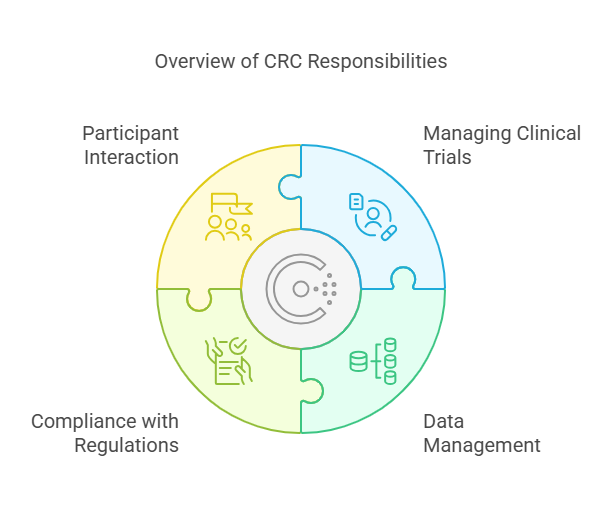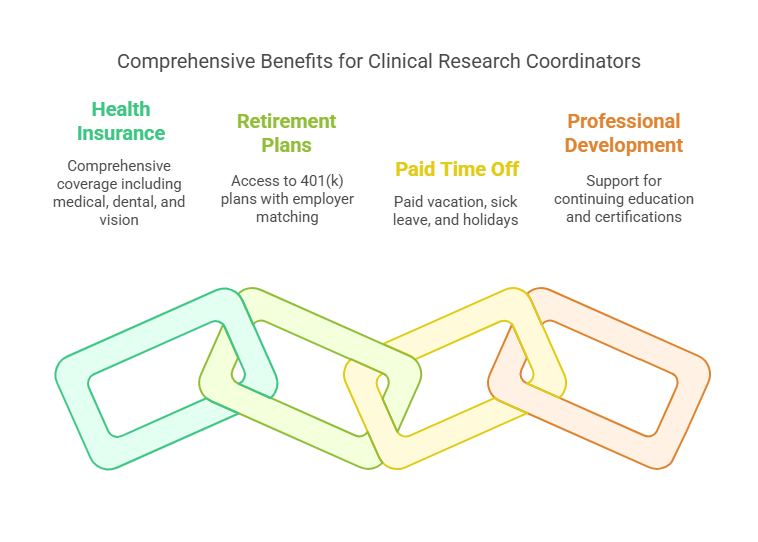Average Clinical Research Coordinator Salary
When deciding to pursue a career in clinical research, one of the most frequent questions is, “How much do clinical research coordinators make?” This role is critical to the success of clinical trials and research studies and is fairly well paid with the salary depending on the level of experience, location, and education. In this blog, we will look at CRC salaries in more detail and try to understand the general industry trends so that you know what to expect when you decide to pursue this career.
What is a Clinical Research Coordinator?
A Clinical Research Coordinator (CRC) is a key person in the management of clinical trials. These professionals are in charge of supervising and performing the research protocols according to the instructions of a principal investigator. They include identifying potential participants, making sure that the trial is conducted in conformity to the set rules and regulations, data management, and making sure that the entire research is carried out ethically.
Key Responsibilities of a CRC:
Managing clinical trials: Making sure that participants, investigators and sponsors are coordinated to ensure the smooth running of the trials.
Data management: To guarantee the accuracy, organization and regulatory compliance of data collected during trials.
Compliance with regulations: Adherence to FDA regulations, ICH-GCP guidelines and institutional policies will be monitored.
Participant interaction: Making sure that participants are recruited, screened and interacted with so they know what the study’s protocols are.
As a CRC, you'll be an essential part of the healthcare and research landscape, facilitating the development of new treatments and contributing to advancements in medical science.
Factors Influencing Clinical Research Coordinator Salary
Salaries for CRCs vary depending on a range of factors, from geographical location to experience and level of education. Let's break down these factors to better understand how they impact compensation.
1. Location
The area of employment of the research coordinator also affects the average salary of a clinical research coordinator. In areas with a large population density and many research institutions and clinical trials, the salaries are usually higher. CRCs in cities such as New York, San Francisco and Boston usually earn more than the national average because there is a high demand for research professionals and the cost of living is high in these cities.
On the other hand, CRCs working in smaller cities or rural areas may earn less, though the cost of living in these regions is also typically lower.
2. Experience
Another crucial factor that determines the salary of a CRC is experience. Entry level CRCs, who have less than one year experience, are likely to be at the lower end of the salary scale, while those with several years of experience can earn a lot of money. Lower end salaries are expected for entry level CRCs, while senior CRCs, who might supervise large teams or multiple trials, enjoy salaries toward the higher end of the range.
3. Education and Certification
Educational background and certifications are also the major determinants of salary. A bachelor's degree is usually the required minimum for a CRC position, but those with more advanced degrees—like master’s in clinical research or public health—tend to make more money. The Association of Clinical Research Professionals (ACRP) and the Society of Clinical Research Associates (SOCRA) certification as a clinical research professional can also pay more.
For those interested in advancing their education or obtaining certification, several comprehensive courses are available, such as the Advanced Clinical Research Coordinator Training from CCRPS.
4. Industry and Employer Type
The industry in which a CRC works can also have a count on the salary. CRCs working in academic settings like universities or research hospitals will have different salary ranges than those working for pharmaceutical companies or contract research organizations (CROs). Usually, the private industry positions are paid more because of the competition in the pharmaceutical and biotech companies.
Average Clinical Research Coordinator Salary in the U.S.
As of the latest data available, the average clinical research coordinator salary in the United States is between $50,000 and $70,000 a year. But this range can be quite distant depending on the factors mentioned above.
Entry-Level CRCs: For CRCs with less than one year of experience, the expected salary ranges between $45,000 to $50,000 per year.
Mid-Level CRCs: 3 to 5 years’ experience may earn $55,000 – $65,000 per year.
Senior CRCs: Senior coordinators have been working for more than five years, and they get paid $70,000 to $90,000 or more if they are the leaders of clinical research departments or manage several trials.
Salary Breakdown by Region:
West Coast: California's CRCs, especially in San Francisco and Los Angeles, tend to make more money because of the presence of biotech firms and research institutions. The average salary for CRCs in San Francisco and Los Angeles is $65,000-$85,000.
East Coast: New York and Massachusetts are widely recognized to have higher CRC salaries, ranging between $60,000 and $80,000 on average.
Midwest and South: CRCs in the Midwest and some Southern states—Texas and Ohio, for example—fall somewhere in between at $50,000 to $65,000 a year.
The Impact of Certifications on Salary
Certifications can significantly impact a CRC’s salary. Many employers prefer or require CRCs to hold certifications from accredited bodies such as ACRP or SOCRA. These certifications not only validate a CRC’s skills and expertise but can also boost salary potential. On average, certified clinical research coordinators can earn between 10-20% more than their non-certified counterparts.
For those interested in gaining certification, it's worth exploring courses like the Clinical Trials Assistant Training, which provides a solid foundation for those looking to advance in their CRC careers.
Future Job Outlook for Clinical Research Coordinators
The demand for clinical research coordinators is expected to grow over the next decade, driven by the increasing number of clinical trials and advancements in medical research. According to the U.S. Bureau of Labor Statistics, employment in clinical research is expected to grow by 8% from 2021 to 2031, which is faster than the average for all occupations . As the healthcare industry continues to evolve, the need for qualified and experienced CRCs will only increase, providing a positive job outlook for those entering the field.
Additional Benefits and Perks
Aside from a competitive salary, clinical research coordinators often enjoy additional benefits such as:
Health Insurance: Most employers offer comprehensive health insurance plans, including medical, dental, and vision coverage.
Retirement Plans: Many CRCs have access to 401(k) plans with employer matching, especially in larger institutions.
Paid Time Off (PTO): CRCs generally receive paid vacation, sick leave, and holidays, contributing to a balanced work-life environment.
Professional Development: Employers often support continuing education and certifications, allowing CRCs to stay updated with the latest trends and advancements in clinical research.
How to Increase Your Salary as a Clinical Research Coordinator
For those looking to increase their earning potential as a CRC, consider the following steps:
Pursue advanced certifications: Certifications from ACRP or SOCRA can significantly increase your salary potential.
Gain experience: As with most professions, the more experience you have, the higher your earning potential.
Consider relocation: Moving to a high-demand area, such as New York or San Francisco, can result in a substantial salary increase.
Further education: Pursuing a master’s degree in clinical research or public health can open doors to higher-paying positions, including senior CRC or clinical research manager roles.
Conclusion
In conclusion, the average clinical research coordinator salary varies based on experience, location, education, and certification. The CRC role is a rewarding and challenging career path, offering competitive salaries, job security, and numerous opportunities for advancement. By understanding the factors that influence salary and taking proactive steps to enhance your qualifications, you can maximize your earning potential and succeed in this vital field.
For those interested in furthering their education and advancing in the field of clinical research, consider exploring additional training and certification options at CCRPS, where you can find courses tailored to help you achieve your career goals.
Explore Courses for Clinical Research Career
Courses Available:
Reference Links:
National Institutes of Health - Clinical Research Coordinator Role Overview - Overview of the CRC role and its impact on clinical trials and medical research.
Association of Clinical Research Professionals (ACRP) - Offers certification and resources for clinical research professionals, which can help increase salary potential.
Society of Clinical Research Associates (SOCRA) - Provides certifications and professional development opportunities for clinical research coordinators.
Glassdoor - Clinical Research Coordinator Salary Overview - A tool for exploring salary ranges and reviews for clinical research coordinator roles by region and experience level.




